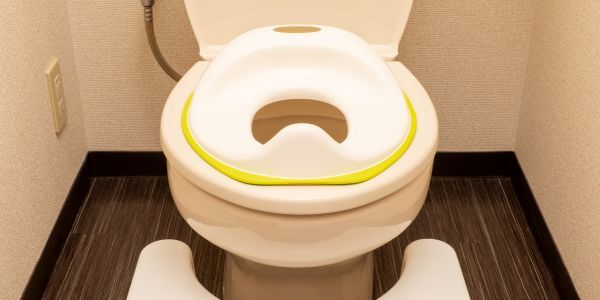

The topic of toileting and starting school has been quite hotly debated in our community recently.
It's that time of year again - the little ones are starting their first day at school, and some parents are in a panic because their 4 or 5 year old still struggles with toileting. Unfortunately, we're seeing a LOT of parents told that their child must be able to toilet with no help or support to start school, and that staff simply cannot provide help.
Luckily for us, we knew that this is actually not only untrue, but unlawful in the UK!
Is it ideal that a child could be starting school still struggling to toilet unsupported? Absolutely not. However, it's not unheard of - around 89% of teachers have at least one child in nappies in their class when starting school - and there are many different causes, all of which require extra support and understanding. In the meantime, many mums and dads are very stressed and worried at the thought that their child could be left upset and struggling - this is rather sad, when starting school is supposed to be an exciting time!
Can a school legally insist a child is toilet trained?
The long and short of it is, no, they absolutely cannot. Under the Families and Children Act 2014, they cannot - yet many still do. When you consider possible staffing difficulties and how busy school environments are, we can understand the potential reluctance, but the fact is that schools can't turn away children who still need toileting support, nor can they refuse to assist a child if it is still needed.
Even if a child has no other SEN/additional needs going on, needing ongoing support with toileting actually falls under the umbrella of additional needs, and refusing to support this is indeed in breach of the Families and Children Act.
In addition, the Equality Act 2010 states that schools "must not discriminate against or disadvantage disabled children or those with special educational needs." Delays in continence is considered a disability even with no other additional SEN needs, so schools actually can't refuse or delay admission to children who are not able to toilet unsupported, or refuse to help.
It says a lot that even NHS resources point this out too - yet some schools are insisting it's their 'individual policy'. No 'individual policy' supercedes the law, the law being the Families and Children Act 2014.
NHS resources also point out that schools should NOT be calling parents in to wipe or clean up their child. In fact, The Department for Education's statutory guidance on supporting pupils at school with medical needs even says that schools should NOT require parents to go into school to' administer medication or provide medical support to their child, including with toileting issues'.
It is also a myth that teachers and support staff are 'not allowed' to wipe or support toileting.
The ERIC website states:
"The Equality Act 2010 states that schools must not discriminate against or disadvantage disabled children or those with special educational needs. A delay in achieving continence - or not being toilet trained - is considered a disability. It is therefore not acceptable for a school to refuse or delay admission to children who are not yet continent.
The Children and Families Act 2014 places a statutory duty on schools to support pupils with medical conditions, including bladder and bowel problems. If a child has an identified continence issue which won't be resolved before they start school (whether related to toilet training or not), the school cannot refuse entry.
Schools must work to support those children in the school environment so they can play an active role in school life, remain healthy and achieve their academic potential. Schools should also avoid putting pressure on parents/carers of children who are having accidents to send them in wearing a nappy 'just in case' an accident should occur.
Schools and parents/carers should work together to identify an appropriate containment option such as a small pad in the child's pants or washable absorbent pants."
What can I do if my child's school is refusing to support my new starter in their toileting?
We'd advise setting up a meeting urgently and reminding the staff of the Families and Children Act and the other information we've provided above. Your local branch of SENDIAS may also be useful in providing school with the guidance. Above and beyond all else, don't be afraid to speak up and advocate for your child. It can be daunting, but the legal framework protecting them is available for all to see. Fundamentally, it is important to maintain a positive dialogue with school, commit to working together, but still stand your ground on the law on this matter.
How can school help to support my child?
As we've previously mentioned, the Children and Families Act 2014 states schools have a statutory duty to support children with health conditions - this includes bowel and bladder problems, which delayed toileting would fall under.
Education resource The School Run has suggested these helpful measures that could be put in place:
- Having a policy setting out how the school will approach toileting. There should be a system in place for meeting all children’s needs; if the blanket toileting policy doesn’t cover your child’s issues, you may be asked to provide parental consent for any changes.
- Providing spare clothes in the case of occasional accidents, and notifying you at the end of the day that your child has had a mishap.
- Working with parents to identify appropriate protection/containment such as incontinence pads or washable absorbent pants; schools shouldn’t put pressure on parents or carers to send their child in wearing a nappy 'just in case.’
- Giving the child a 'toilet card' or similar that allows them to go to the toilet whenever they need to. The school may ask for a signed letter from a health professional stating that they have a condition that means they need a toilet pass.’
- Providing children with ongoing problems with an Individual Healthcare Plan. This is essential to ensure their needs are sensitively and effectively, and that all people responsible for the child understand their needs.
- You can help by providing your child with changes of clothes and spare continence products, if they need them, to be kept at school.
"As they get older, you can encourage them to become more independent in how they deal with their continence issues, although they should still be helped if and when they need it."

How can I support my child to improve their toileting?
You could check out the ERIC website. From experience, we'd also encourage requesting an appointment with your local continence team for support and advice.
If you're concerned that your child may have unidentified additional needs that could be linked to toileting issues - for example, many autistic children have toileting delays - we'd encourage pushing for a referral, remembering that even if a school 'doesn't see it', they aren't neurodevelopmental specialists, and that your child is entitled to the correct support. It is worth remembering that toileting delays are not always related to an underlying condition, of course.
Some parents of children with additional needs who aren't well supported by school do a parental application for an EHCP - Education and Health Care Plan - using this template by IPSEA. Schools can also apply but if you're having difficulty in being listened to, you are allowed to apply as a parent. The legal minimum for assessment for an EHCP is - may have SEN, and may benefit from an EHCP, any 'local policies' used to refuse to assess are actually unlawful as per the Families and Children Act. An EHCP can include provision to support your child in their toileting, if needed. Otherwise, if your child's only additonal need is surrounding toileting, the previously mentioned IHP could be your best route.
Finally - if your child is classed as 'summer born', you are legally allowed to request that they defer their start date at school until they are 5, which is the compulsory school age, contrary to popular belief that this is 4. You will also have the right for them to start in reception, 'out of cohort', rather than going straight into year 1. Some counties are more amenable to this than others, but we strongly suggest you speak to your own Local Authority. You can find out more here. This might be a good solution to give a summer born child more time, if you're really worried that local schools will be unwilling to support any toileting needs (regardless of the law).
Our verdict...
It does worry us to see so many parents given the wrong information on this matter. Fundamentally, there will always be a small minority of children who struggle to be clean and dry out of nappies by the time they start school, for various reasons - the more we spread the word what the rules on this actually are, the less problems other parents and children should have in future.
We fully appreciate and empathise with the struggles that schools may have with staffing levels and safeguarding, as it is additional work and stress, but it is down to them to come up with a system that works under the Families and Children Act until your child is finally clean and dry. By working together collaboratively, your child will be happy, supported and hopefully toilet trained before long!
*Note - please be aware that by school, we are referring to starting reception, as opposed to preschool or a nursery setting.*
If you liked this you might like...




.png)



.jpg)
.jpg)
